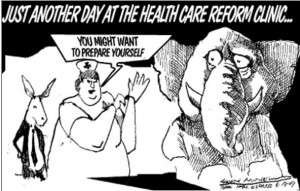With the passage of Obamacare, responsibility for health care policy passed decisively to the federal government. If the polls can be trusted, it looks increasingly like Barack Obama will be re-elected president, which means the chances of repealing the health-care overhaul is just about nil. The question for Virginians then becomes, is there anything we can do at the state level to reform the health care system in accordance with our own philosophies and values?
There are near-term decisions that must be made in response to the federal law. Do we expand the Medicaid program? Do we set up a state health insurance exchange? Those issues can be debated, but the discussion should not stop there. We should never stop asking ourselves, what can we do to boost productivity and quality in Virginia’s health care system?
The General Assembly took one important step earlier this year when it created the Virginia All-Payer Claims Database with the goal of facilitating “data-driven, evidence-based improvements in access, quality, and cost of health care” by analyzing spending patterns and the performance of different providers. Aside from setting up an Advisory Board on Health Care Data Reporting, it is not clear from the description of the legislation how the data will be used. But there can be little doubt that better data will help drive better results.
And that brings us to an idea discussed in the Wall Street Journal today, “How to Stop Hospitals from Killing Us.” Author Marty Makary writes that a quarter of all hospitalized patients will be harmed by a medical error of some kind. “If medical errors were a disease, they would be the sixth leading cause of death in America — just behind accidents and ahead of Alzheimer’s.”
Makaray says that every hospital should have an online information dashboard that makes public its rates of infection, readmission, surgical complications and inexcusable errors, such as leaving a surgical sponge inside a patient. According to the limited experience so far, he says, “Nothing makes hospitals shape up more quickly than this kind of public reporting.”
Virginia should take the lead in getting hospitals to report quality data like this, along with price data for common procedures. The health care marketplace cannot function without price and quality data to empower consumers (or for insurance companies working on their behalf) to make informed decisions. The main question worth debating is whether the state should mandate the reporting of the data or if there is a way to coax the industry into implementing the standards voluntarily.
Makary also recommends the use of video cameras to ensure compliance with best practices during surgery, and even in rest rooms to ensure that employees wash their hands (the single-most effective method of preventing the spread of disease). Sounds like a great idea. The hospital industry may have other thoughts, but it’s certainly worth discussing.
Obamacare has many abominable features — it imposes taxes, fees and levies out the wazoo, it adds regulations and mandates out the ying-yang and it will trigger a massive influx of new patients — all of which will drive up health care costs. Even though the law appears increasingly likely to survive, Virginia does not have to sit by passively as our health care industry staggers under the burden. We still have some latitude to pursue our own vision of what health care should look like. Instead of weeping in our beer, we should take maximum advantage of the opportunities left to us.
— JAB



